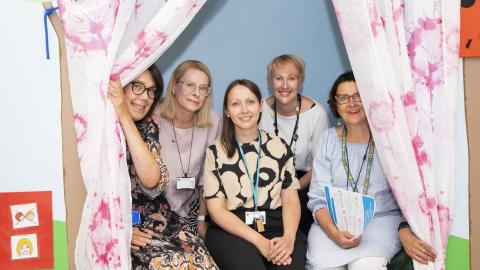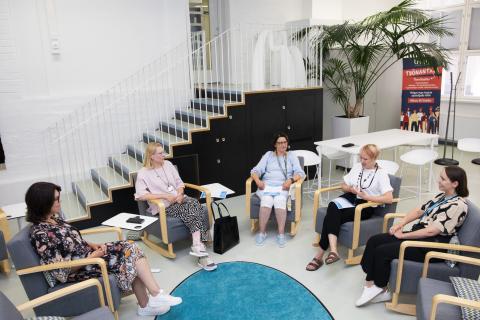PEITTO training combines theory with practice for early childhood educators

The Peitto (Implementing pedagogical culture in early childhood education and care) in-service training programme was created by a team of ten people at Tredu's Department of Education and Counselling. The background to this was, among other things, the renewal of qualifications and the observation that there was no any longer advanced training available for early childhood education nurses. The new professional qualification in education and guidance met the needs of working life.
There was immediate interest in the new programme, even though it was initially marketed on a small scale by word-of-mouth, by calling familiar partners.
- Initially we had individual nurses from Pirkanmaa in the training. Soon the interest in the Peitto training increased and we conducted municipality-specific Peitto trainings. A few private day-care chains were also involved right from the start, recalls Päivi Kinnunen, a lecturer.
- After that, we contacted the early childhood education directors of a few municipalities, and the early childhood education nurses also started spreading the word to each other. Now we have trained people in 120 kindergartens, says Annika Kujanpää, training planner.
The National Centre for Educational Evaluation Karvi has also taken note of Peitto. In its evaluation this year, it considers it a good practice of cooperation between education and training providers and working life.
The working group that developed the blanket was also awarded a prize in the City of Tampere's Personnel as Developers 2024 competition.
Tasks carried out at the workplace
- During the training, we will discuss everyday pedagogy and look for solutions to everyday practical challenges and how to implement early childhood education plans and quality early childhood education in everyday life together with the team. The learning activities are carried out on-site at the nurses' own workplaces. There, they also receive peer support from other colleagues, says Riikka von Bonsdorff, class teacher.
The apprenticeship is a five-month multi-disciplinary apprenticeship alongside work. It is part of a project funded by the Apprenticeship Fund called Ideas to Products, with Tredu as the main contractor. Project manager Hanna Orava thinks that the idea of Peitto fits perfectly into the project.
- The project has developed new, customer-oriented apprenticeship products and training models that meet the changing needs of working life and the individual needs of citizens for continuous learning throughout their careers. Peitto is a prime example of this, he praises.
There is also an online version of the training, which in principle allows it to be disseminated nationwide. The training consists of seven days in location, during which the theory is linked to the students' own work practice.
The Peitto has been further developed along the way and the ideas have also been brainstormed with early childhood education partners, early childhood education directors and planners from Pirkanmaa.

Training increases well-being at work
The child is always at the centre of early childhood education and this is also the case with Peitto. By strengthening their skills, nurses are better able to bring out the child's perspective and promote child inclusion.
Developing professional skills in turn increases well-being at work. When people know they know their job and can do it well, they don't have to worry about their performance and their job satisfaction improves. Naturally, this has a positive impact on children in early childhood education and care. At the same time, the employer's retention rate increases when quality training is available.
When one learns, the whole community learns
By training one group of workers, the whole community learns at the same time. The implementation of the pedagogical culture mentioned in the title of the Peitto is also part of this. Childcare workers deepen their understanding of the concepts of the ECEC curriculum, which puts them on the same map as ECEC teachers. This in turn supports the work of teachers.
The plans to abolish municipal ECEC plans are a concern for Tredu teachers.
But why Peitto? It's short for the long Finnish name of education, but it also has a symbolic meaning.
- Peitto (blanket) is safe. It's good and comfortable to be under, say the developers.